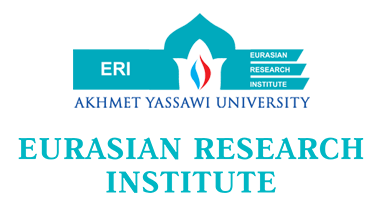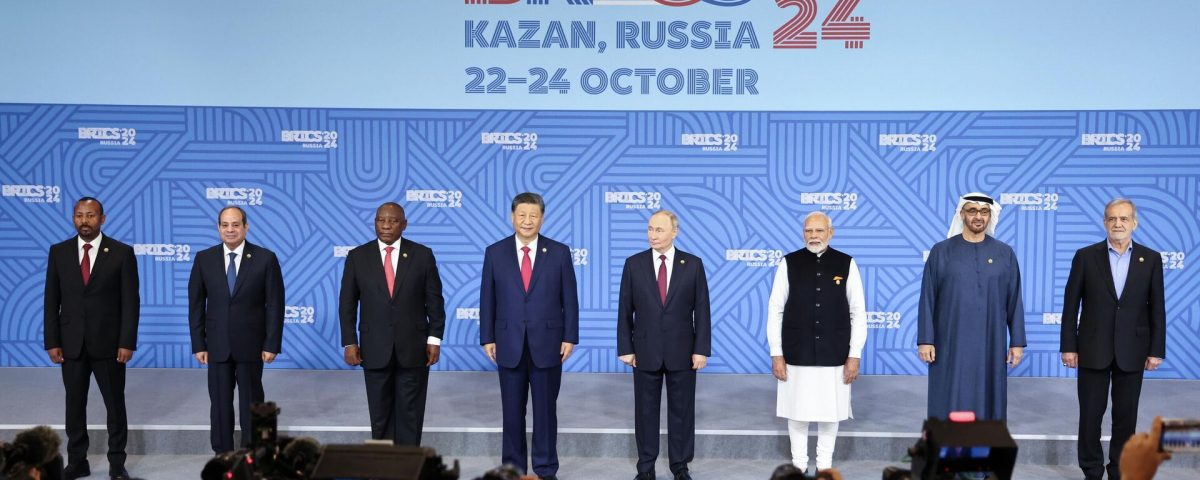The sixteenth annual BRICS summit took place in Kazan, Russia from October 22-24, 2024. The summit’s key takeaway was that the group, originally composed of Brazil, Russia, India, China, and South Africa, met for the first time after admitting four new members on January 1, 2024—Egypt, Ethiopia, Iran, and the United Arab Emirates. Saudi Arabia has received an invitation to participate but has not yet accepted it. Argentina’s new president, Javier Milei, withdrew the application because he deemed it “not appropriate” for the country [BBC, 2023]. In addition to the alliance members, more than 30 delegations, 22 heads of state or government, and numerous representatives of international organizations, including UN Secretary-General António Guterres, attended the summit.
Since its inception, BRICS has been considered an alliance of developing nations to serve as a geopolitical and geoeconomic counterbalance to the West. Western powers frequently exclude the countries in Africa, Asia, and Latin America from discussions, thereby perpetuating the Global South’s long-standing marginalization in crucial international decision-making forums, such as the World Bank and the International Monetary Fund. Therefore, BRICS has called for reforms to key international institutions. BRICS is also viewed as a response to perceived imbalances in institutions like the G7 and the G20. For many years, the G20—which consists of both developed and emerging economies—has functioned as a platform for international economic cooperation. However, the G20’s capacity to handle global issues has left the BRICS nations and other middle powers dissatisfied.
BRICS, with its collectively significant share of the world’s population, GDP, and combined influence, has become a significant player in driving these changes. The recent expansion demonstrates BRICS’s aspirations to establish an alternative world order by elevating the viewpoints of the Global South and integrating them more prominently into global discussions. The alliance initiated a growing number of projects and collaborations in a variety of fields, such as sustainable development, health, and finance with a strong emphasis on South-South cooperation. However, despite these aspirations, the disparities among BRICS members raise doubts about the bloc’s ability to implement coherent policies.
These contradictions were evidenced during the Kazan summit titled “Strengthening Multilateralism for Just Global Development and Security”. As the host, the Russian President Vladimir Putin aimed to fortify the alliance’s anti-Western stance and establish himself as the leader of the future “world majority”. He advocated for rule-based multilateralism and asserted the strong geopolitical role of the “Global South and Global East,” recognizing Russia and China as the dominant forces of the “Global East” [Holtzmann, Kochlowski-Kadjaia, 2024].
Yet, despite the calls for strengthening the role of the Global South, there are contradictions among BRICS members, particularly regarding anti-Western rhetoric. Specifically, India and Brazil oppose the anti-Western stance, as both nations maintain comprehensive bilateral cooperation with Western countries. Although India and Brazil exhibit a certain inclination toward liberating themselves from the hegemony of the dollar, their aspirations do not align to the same degree as those of China or Russia. Brazil’s president, Luiz Inácio Lula da Silva, for instance, insisted on excluding the anti-Western language in the summit communique [Wintour, 2024]. Similarly, such contradictions are visible among the new entrants: Iran, which is subject to severe Western sanctions, views BRICS as an essential platform for avoiding the US-dominated SWIFT financial system and fostering economic resilience. Whereas, the UAE, an important Western ally, possesses its own interests and seeks to penetrate BRICS markets without embracing an anti-Western stance [Holtzmann, Kochlowski-Kadjaia, 2024].
The Kazan Declaration underscores the necessity for a multipolar world order, where power and influence are allocated more equitably across diverse global regions. It avoided any direct mention of the United States and focused on the issues related to multilateralism, global development, and security. The declaration promotes reforms in international organizations such as the United Nations and highlights a commitment to a multipolar world order. It also emphasized the need to alter the current international financial infrastructure in order to address global financial concerns, advocating for the IMF and World Bank to more accurately represent the economic contributions of developing nations. To lessen dependency on the US dollar, the declaration encourages the use of local currencies in transactions among BRICS members and supports the further advancement, including the creation of payment and settlement systems (BRICS Pay) for the use of national currencies. The declaration also emphasizes the importance of combating climate change. The necessity of providing developing countries with more assistance in reaching the Sustainable Development Goals, especially in sectors like healthcare, education, and poverty alleviation is also stressed by the BRICS nations. Cooperation in science, technology, and innovation is emphasized in the declaration with calls for supporting efforts to bridge the technological gap between developed and developing nations. The other crucial areas of cooperation include enhanced cultural exchange, cooperation in education, tourism, and people-to-people interactions to strengthen relations between the BRICS nations and the larger international community, as well as collaboration in the healthcare sector [BRICS, 2024].
Meanwhile, the world media hailed the summit as a diplomatic success for Russia, as it was the first international gathering that Russian President Vladimir Putin had hosted since the war in Ukraine. The summit gave President Vladimir Putin the opportunity to show that, despite the Western sanctions on Russia, it remains open to interaction and trade with its international partners. He also endeavored to advance an anti-Western agenda, lead discussions on the necessity of alternatives to dollar-centric financial systems, and diminish dependence on Western currencies, all in light of Russia’s own challenges stemming from sanctions. President Putin aspired to utilize the summit to position himself as a leader who is not internationally isolated, but instead, in conjunction with the BRICS nations, represents the future “world majority” or the Global South.
Russia has focused on three main areas since assuming the rotating BRICS presidency in 2024: politics and security, economy and finance, and cultural and humanitarian cooperation. In addition, 40 measures spanning a wide range of themes, including the integration of the association’s new members, forging strong BRICS links with developing countries, combating money laundering, and fighting terrorism, were part of the Russian BRICS agenda. Over the course of 2024, the Russian government plans to host more than 200 side events and meetings [EPRS, 2024].
Expanding the BRICS membership is another goal of the Russian presidency. The Kazan summit did not add any new entrants, but the alliance is holding consultations on obtaining the status of a BRICS partner state with 13 countries [TASS, 2024]. The press also speculated about Türkiye’s formal intention to join BRICS, becoming the first NATO member to do so [Voanews, 2024].
Positioning itself as a middle power, Kazakhstan received an invitation to join BRICS but paused it for the time being due to the development prospects of this alliance. A press spokesman stated that Kazakhstan views the UN as the “universal organization with no alternative, where we can and must discuss all current international problems”. Kazakhstan’s President Kassym-Jomart Tokayev attended the BRICS summit in an extended “outreach” format and had numerous sideline meetings with participating leaders [Tengrinews, 2024].
Overall, the BRICS summit in Kazan demonstrated the continuity of BRICS goals in reforming the global political and economic mechanisms. Given their diverse political, cultural, and economic backgrounds, the new entrants to BRICS presented both opportunities and challenges. However, following decades of robust economic expansion, the emergence of BRICS+ indicates that emerging markets are now ready for a more significant role in the global order. Emerging middle powers use the BRICS mechanisms as a platform to advocate for a more inclusive and multipolar global order. Therefore, the Western-led platforms—such as the G7 and G20—must acknowledge the growing significance of the Global South and interact more positively with the middle powers. The BRICS summit emphasizes the growing importance of middle powers in determining the direction of global governance and the necessity of reforming multilateral institutions.
For Kazakhstan and Central Asia in general, it is essential to be part of the global governance dialogue. The BRICS mechanisms offer Kazakhstan the chance to participate in middle-power discussions within international frameworks without succumbing to the rhetoric of other countries’ interests. For the time being, Kazakhstan has wisely chosen not to become a full member of the alliance, avoiding the anti-Western atmosphere of BRICS. Kazakhstan, with its multi-vector policy, has already promoted itself as a reliable international partner. Therefore, while not escaping the BRICS discussions, Kazakhstan sticks to its foreign policy strategy and conducts bilateral and multilateral relations based on universal rules.
References:
BBC (2023). Argentina pulls out of plans to join BRICS bloc. Retrieved from https://www.bbc.com/news/world-latin-america-67842992. Accessed on 15.11.2024.
BRICS (2024). XVI BRICS Summit. Kazan Declaration. Retrieved from https://cdn.brics-russia2024.ru/upload/docs/Kazan_Declaration_FINAL.pdf?1729693488349783. Accessed on 15.11.2024.
EPRS (2024). The outcome of the 16th BRICS Summit in Kazan, Russia. Retrieved from https://www.europarl.europa.eu/thinktank/en/document/EPRS_ATA(2024)766243. Accessed on 15.11.2024.
Holtzmann, Hans-Dieter, Kochlowski-Kadjaia, Ute (2024). The BRICS Summit 2024 in Kazan – a world stage for Putin? Retrieved from https://www.freiheit.org/brics-summit-2024-kazan-world-stage-putin. Accessed on 15.11.2024.
TASS (2024). BRICS member states now discuss partner status of 13 countries — Kremlin aide. Retrieved from https://tass.com/politics/1859843. Accessed on 15.11.2024.
Tengrinews (2024). Kassym-Jomart Tokayev received proposals on Kazakhstan’s accession to BRICS – Berik Uali. Retrieved from https://tengrinews.kz/kazakhstan_news/kasyim-jomartu-tokaevu-postupali-predlojeniya-vstuplenii-551133/. Accessed on 15.11.2024.
Voanews (2024). Türkiye’s BRICS bid ahead of the Russia summit plays both sides. Retrieved from https://www.voanews.com/a/turkey-s-brics-bid-ahead-of-russia-summit-plays-both-sides/7787210.html. Accessed on 15.11.2024.
Wintour, Patrick (2024). Putin returns to the world stage hosting 36 leaders at the BRICS summit in Russia. Retrieved from https://www.theguardian.com/business/2024/oct/22/putin-brics-summit-russia-china-india-iran-kazan. Accessed on 15.11.2024.
Note: The views expressed in this blog are the author’s own and do not necessarily reflect the Institute’s editorial policy.

